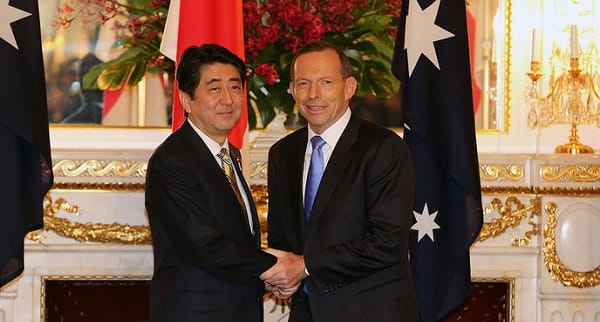Japan and Australia have agreed on a bilateral Free Trade Agreement (FTA). This is the first time a major agricultural exporting nation has concluded a trade deal with Japan, and it sets a positive precedent for the successful conclusion of the regional-level Trans-Pacific Partnership (TPP) talks.
The deal was announced by Japanese Prime Minister Shinzo Abe and his Australian counterpart Tony Abbott, during Mr Abbott’s visit to Japan. The deal may be signed as early as this summer, entering into force by 2015.
Cheaper beef, cars
Japan’s agricultural lobby is extremely influential, and has generally opposed the signing of FTAs, as they could lead to the lowering of Japanese tariffs on imported food. The agricultural lobby believes that such tariffs are necessary for the survival of Japanese farms, which would otherwise face tough competition from the much larger agribusinesses in countries like Australia and the United States.
But Japanese car manufacturers like Toyota and Mitsubishi are strongly in favour of FTAs, as they would benefit from greater overseas market access. The agreement between Japan and Australia illustrates the competing interests of the agricultural and automobile industries.
Under the new FTA, Japan will reduce its tariffs on Australian beef by up to half. In exchange, Australia will effectively abolish its tariffs on the import of Japanese vehicles. This is not much of a concession for Australia, as it is no longer competing with Japan in automobile manufacturing. Australia’s car making industry has effectively collapsed, with Ford, General Motors’ Holden and Toyota all shutting down their factories by 2017.
What this means for the TPP
The Japan-Australia agreement shows that Japan is willing to compromise on agricultural tariffs. This is a good sign for negotiations on the regional TPP trade agreement, a grouping of 12 countries that includes Japan, the US and Singapore.
The TPP talks have suffered repeated delays; Japanese opposition to agricultural tariff reduction has been a sticking point. But a breakthrough could now be possible. American and Japanese negotiators are currently holding discussions ahead of US President Barack Obama’s trip to Japan. It would be a coup for both Mr Obama and Mr Abe if there was clear progress on the TPP by the time Air Force One touches down in Tokyo on 24 April.
A positive sign for Abenomics
Mr Abe appears to be in favour of signing more trade agreements for his country. Even if some domestic sectors like the food industry suffer losses, the overall benefit to the Japanese economy is expected to outweigh the costs. The successful conclusion of the Japan-Australia bilateral agreement may also demonstrate that Mr Abe is making headway in convincing conservative elements of his own party about the urgent need to open up Japan’s economy.
Sources
Japan, Australia agree in principle on EPA [Asahi Shimbun, 7 Apr 2014]
Trade deal: Japan wins, and why that’s good for Australia [Sydney Morning Herald, 8 Apr 2014]
Photo Credit: Australian Prime Minister’s office




